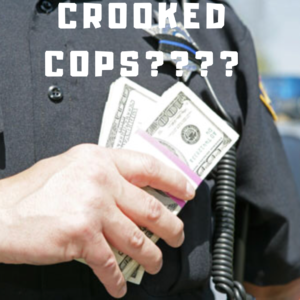 Are law enforcement agencies committing theft? Well we won’t go that far, but at minimum I feel they are definitely committing the civil tort of conversion when they are seizing money and other property without following provisions of the Florida Contraband Forfeiture Act (“FCFA”).
Are law enforcement agencies committing theft? Well we won’t go that far, but at minimum I feel they are definitely committing the civil tort of conversion when they are seizing money and other property without following provisions of the Florida Contraband Forfeiture Act (“FCFA”).
Lately I’ve been hearing stories of police taking money from people even though they were not arrested nor were they given a property receipt. At that point, I would be frantic; because there’s no documentation to support that the police took your money. However, someone that they were with was arrested during the time their money was seized, so the seizure is documented on the arrestee’s police report.
Below are 2 of the most common hypothetical situations police seize money:
- Bob is riding in Billy’s car, with Billy driving. Billy has 15 grams of marijuana in a book bag he has located next to him. Bob has a book bag next to him, which contains $3,000 of his hard earned money. After getting pulled over, and the car being searched due to an odor of marijuana, officers discover Bob’s $3,000 and seize it.
- Using the same facts in the hypothetical above, Billy could also have $3,000 in his book bag that contained 15 grams of Marijuana. The police also seize Billy’s money and marijuana, and then arrest him for a misdemeanor possession of cannabis.
In the above 2 hypotheticals, what may typically happen is that Billy would get arrested, and police would document the $3,000 as being taken into evidence. Bob’s $3,000 would be documented as taken into evidence, but Bob would be free to go, and not get arrested. Bob will go the police station to try and get his money, but they will tell him that it’s being used for evidence, and that he can’t get it back. Billy would probably disregard that his money was taken, and take it as a loss.
Hellooooo Billy and Bob, don’t you know that the 4th Amendment of the United States Constitution and Article I, Section 12 of the Florida Constitution protects against unreasonable searches and SEIZURES? The 5th and 14th amendment of the United States Constitution also indicates that no person shall be deprived of their life, liberty, or PROPERTY without due process of the law. These constitutional provisions brought about Florida Contraband Forfeiture Act, contained in Florida Statute 932.701 through 932.706.
What is Due Process?
Due Process is defined as fair treatment through the normal judicial system, especially as a citizen’s entitlement.
What is The Florida Contraband Forfeiture Act?
FCFA governs the seizure of real and personal property by law enforcement. Florida Statute 932.701(2)(a) defines what Contraband is. In summary and in relevant part, Contraband is considered any money or other property deriving from, or being used for illegal drugs or felony activity. This act allows law enforcement to obtain ownership of your property, if there is a belief that there’s a connection to illegal drugs, or felony activity, and ONLY if the person is arrested in connection with that activity, however the statute suggest that if the property is money or any other monetary instrument, there is no requirement of an arrest. In any event, whether arrested or not, a law enforcement agency must follow the procedures laid out in the Florida Contraband Forfeiture Act before taking your property.
So What Should The Law Enforcement Agency Do When Seizing Property?
- They should definitely give you some type of property receipt, although FCFA does not require.
- If the owner is known to law enforcement, they should provide you with notice within 5 days of the seizure, sent by certified mail with return receipt, that you have a right to an adversarial preliminary hearing to determine whether there is probable cause to continue to seize your property.
- If the owner is not known, law enforcement must make a diligent effort to locate the owner, and provide notice to them that their property will be subject to forfeiture.
- In any event, law enforcement must initiate forfeiture proceedings within 45 days of seizure, or at most, 60 days, if good cause is shown why it could not have initiated in 45 days.
- If probable cause is determined to continue the hold of your money, you are entitled to a jury trial to make the final decision of whether your property will be forfeited.
- If probable cause is not found, your property must be immediately returned within 5 days, and your Attorney can be awarded Attorney fees up to $1000.
With the laws of FCFA existing in the State of Florida, I rarely see it put into practice. Everyday law enforcement is seizing money in relation to an arrest, and the property owners are not being afforded due process before being deprived of their property.
If law enforcement has not followed proper procedures laid out in FCFA and continue to hold your property past the 45 or 60 days mentioned above, you may have to initiate an action of replevin against the law enforcement agency. It is always best to seek the advice of an Attorney when dealing with law enforcement in these situations.
Don’t let law enforcement steal your property, fight back!
Share this post on your social media, or email a friend. Subscribe to my blog to catch more legal tips.